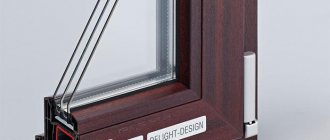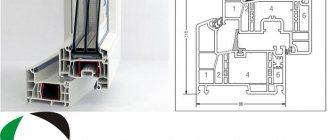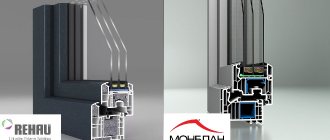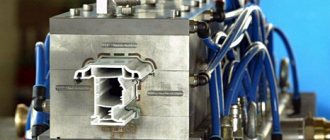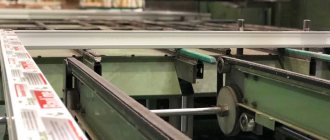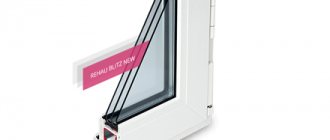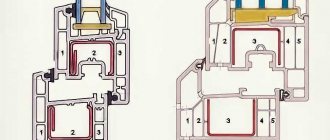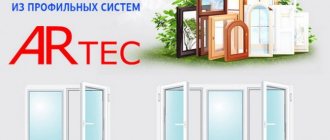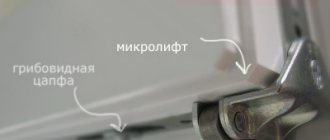Two manufacturers Deceuninck (Belgium) and Rehau (Germany) have earned trust in the Russian market. Plastic windows based on them are distinguished by thermal insulation, sound absorption and durability. Deceuninck is a fairly “young” player in the PVC products market, but is increasing its popularity due to its premium appearance. Rehau has long been a brand that has stood for quality for 50 years. But when the task is to choose one of the profiles, customers have a reasonable question: which is better Deceuninck or Rehau. Let's figure it out.
Product range of Rehau and Deceuninck
A huge range of products means you can choose a high-quality solution for glazing your home. There is no single ideal profile system that would satisfy the desires of thousands of users. In this regard, the companies Rehau and Deceuninck have developed a number of profile lines that solve a specific problem. To understand what you need, you need to start with a review of popular profiles for plastic windows.
Rehau products
The most popular models of the German concern are:
- Blitz New is a budget line with 3 air chambers that will satisfy the basic needs of glazing apartments and houses;
- Thermo is a new product, the main difference of the profile is 4 chambers with an installation depth of 60 mm, while the standard has 3 chambers at the same depth;
- Grazio - elegant design due to beveled overlaps and the ability to choose any type of curly beads;
- Delight – the company positions this profile as one of the “lightest” thanks to the decision to reduce the height of the frame and sash, thereby increasing the area of the light-transmitting zone;
- Brillant - the profile is valued because it is produced in Germany and is distinguished by high levels of heat and sound insulation;
- Intelio 80 – ensuring peace and quiet in the apartment under any circumstances is possible when using this system;
- Geneo is the maximum in everything; this particular profile has the highest heat transfer - 1.05 (m2x°C)/W.
You can read more about each system in this section.
Deceuninck products
Every year, Deceuninck releases improved models of its own lines, which +/- differ in technical characteristics, so let’s look at the main range of products:
- Bautek NEO is a 5-chamber system with a 71 mm profile width, due to which the heat loss coefficient reaches 0.78 (m2x°C)/W;
- Favorite - this Deceuninck line includes several models - Crystal, Arctic, Platinum, etc.;
- Favorite Space - belongs to class A, has 6 air chambers and a heat loss resistance coefficient of 0.94 m2x°C/W (without reinforcing liner);
- Eforte - high noise insulation and burglary-resistant system with 6 chambers with an installation depth of 86 mm;
- Forward - an inexpensive class profile among Deceuninck, 3 air chambers and a maximum glass thickness of 38 mm;
- Eco 60 is an alternative to Thermo from Rehau, which also has 4 chambers with an installation depth of 60 mm.
Deceuninck Eforte
Window and door units made using 6-chamber Eforte profiles have an installation depth of 84 mm and 3 sealing contours, which minimizes the likelihood of blowing and moisture ingress. Manufacturers have further increased the level of tightness by increasing the width of the rebate to 9 mm. This allows you to press the sash more tightly around the entire perimeter to the frame and has a positive effect on sound insulation.
The special design of the glazing beads with 2 legs makes it much more difficult to squeeze the glass unit out of the light opening. In addition, to increase the level of security in the Eforte system, the axis of the fitting groove is shifted by 13 mm, which makes it possible to integrate reinforced locking mechanisms.
The main differences between Rehau and Deceuninck
The main differences between Deceuninck and Rehau profiles can be seen in price: the latter are cheaper and more tailored to standard consumer requirements.
In addition, the Rehau seal is superior to Deceuninck and all other competitors. Even at extremely low temperatures there will be no frost on the windows. In addition, the company produces 3 color options for the sealing gum - white, series and black. Perhaps for some this is a trifle, but for some it is a pleasant bonus in the design of PVC structures.
Deceuninck profiles allow the installation of a wide double-glazed window, which has a positive effect on the thermal insulation of the window. With Rehau this is easily compensated for by an increased number of air chambers.
These are the three main differences between Rehau and Deceuninck to consider when choosing.
Deceuninck Favorit Crystal
A distinctive feature of this 5-chamber system is two white sealing contours and the original shape of the profiles, the outer side of which resembles the edges of a crystal due to the 45% bevel of the frame and sash profile. This design feature explains the name of the windows.
The Favorit Crystal system is suitable for assembling structures adapted for the installation of double-glazed windows. Favorit Crystal profiles have high static stability, thanks to which products made from them, reinforced with steel liners, can withstand even extreme wind loads.
Comparison of Deceuninck and Rehau profiles by characteristics
Rehau and Deceuninck belong to class A, not taking into account the Bautek series from Deceuninck (class B), and boast models for consumers with different levels of solvency. In terms of cost, the profiles do not differ much, which cannot be said about their technical characteristics. Therefore, when choosing Deceuninck or Rehau windows, pay attention and compare the following criteria:
- installation depth of the box;
- number of air chambers;
- maximum permissible glass thickness;
- type of reinforcement;
- number of sealing circuits;
- outer wall thickness;
- roundness of the frame and decorative overlays.
An analysis based on these criteria will help you determine which profile is better - Rehau or Deceuninck.
Indicators for sound and thermal insulation
The decision to replace old wooden frames with Deceuninck or Rehau windows is based on the fact that the room needs to provide a high level of heat and sound insulation. This will not only make life comfortable, but will also help you save on heating costs during the winter season.
As a rule, these parameters directly depend on the tightness of the window structure. And it, in turn, is influenced by:
- thickness of the installed glass unit;
- number of cameras inside the profile;
- seal quality.
The thicker the glass unit, the more air it contains, which keeps heat inside the glazing. For comparison: a glass fill with a thickness of 36 mm contains 12 ml of air, and a 40 mm thick glass fill contains 14 ml of air.
For those who live in “difficult conditions” - near a busy area, near production or in a cold climate, the number of air chambers is fundamental. The optimal figure is 5-6 air chambers. In this case, the sound insulation level will be up to 40 dB, and the thermal protection coefficient will be 0.80-0.85 m2C/W.
In combination with the number of chambers, the thickness of the glass unit additionally influences the thermal and sound insulation performance. Let's look at an example.
's window with a glazing width of 35 mm and a 3-chamber system has a thermal protection index of 0.64. For Deceuninck windows with the same number of cameras, but with a 38 mm glass unit, this figure is 0.70.
If you choose a smaller glazing thickness, compensate for this with an increased number of air chambers in the profile.
The maximum coefficient now is 1.05 m2C/W. Rehau has a Geneo with 6 chambers and a glass thickness of 53 mm, while Deceuninck has an Eforte profile with 6 chambers and a glass thickness of 56 mm.
In general, due to the greater thickness of the double-glazed windows, Deceuninck has an advantage over its main competitor, but loses in the quality of the seals.
The quality of the seals used
The rubber seal at the base of the window system ensures a tight seal between the sash and the frame. This affects the level of sound insulation, water resistance and protection against drafts. Both manufacturers use a seal, but it differs in the number of circuits and configuration. Namely:
- Deceuninck - for the budget series, double-circuit seals are used, for the premium class - three-circuit. The configuration of the seal is a chamber with an adjacent petal.
- Rehau is a 4-circuit seal with two petals without space between them, which prevents the accumulation of moisture and the formation of ice.
The solution from the German manufacturer is one of the best, and is also superior to the Deceuninck seal.
Steel profile inside PVC structure
In order for the window to serve for the longest possible period and not deform during operation, the profiles must be equipped with a reinforced contour - the so-called galvanized steel stiffener inside the PVC structure serves as the frame of the window, which does not allow the sash and frame to sag. Also, the reinforcement inside the frame allows us to produce windows of any shape and specified sizes.
The types of reinforcement differ for each manufacturer. The Rehau profile is produced with a G-shaped type of reinforcement, which is used in the sash and frame. The Deceuninck profile in budget versions is made with U-shaped reinforcement; for the premium class, a G-shaped steel frame is installed.
Mounting depth of profiles
One of the main factors influencing the reliability of installation and thermal insulation of a window is the installation depth of the frame. The larger it is, the better the characteristics. The minimum value for these brands is 60 mm. The range of installation widths for Rehau is from 60 to 86 mm, for Deceuninck – from 60 to 84 mm.
You shouldn’t “go too far” without thinking when ordering a profile with a maximum depth value. Firstly, it is expensive, and secondly, it creates additional loads on the opening. If you live in a temperate continental climate (Moscow) in a residential area (no noise from cars or production), such a window will be a waste of money for you. In this case, it is optimal to choose a 60 mm system.
Number of air chambers
Inside the profiles of the manufacturers Deceuninck and Rehau there are partitions that form spaces called air chambers. The chambers are responsible for the level of thermal insulation and noise absorption. The more cameras, the better these indicators.
For northern regions, the optimal choice would be a 5 or 6-chamber profile.
The Rehau company has Delight, Gracio, Brillant, Intelio, Geneo. You can find out more about each by following the links. The Deceuninck company has profiles Favorit, Favorit Space, Eforte.
For southern regions, where the average annual temperature does not exceed -18˚С, it is permissible to install 3 or 4-chamber systems.
The Rehau company has Thermo, Blitz New, Sib-Design. You can find out more about each by following the links. The Dekenink company has profiles Forward, Bautek, ECO 60.
Profile wall thickness
According to GOST 30674-99, the minimum thickness of the outer wall for windows installed in residential buildings must be at least 3 mm. Rehau produces systems with a thickness of 2.8 mm, Deceuninck - from 2.5 mm. This allows you to select windows not only for an apartment or country house, but also for glazing dachas, verandas, terraces, and balconies.
The thickness of the outer wall provides strength and durability, and also increases the weight of the entire window. This indicator affects the thermal insulation of a plastic window, where a thickness of less than 3 mm is not acceptable for residential premises.
Maximum glass thickness
The light transmitting area of the window occupies almost 80% of the total structure. Its main task is to transmit sunlight, retain heat indoors, and absorb sound waves. Single-glazed windows have been replaced by double-glazed windows that cope with the assigned tasks.
The most popular are two-chamber (up to 36 mm, 3 glasses) and three-chamber (up to 53 mm, 4 glasses) double-glazed windows.
The Rehau company can install double-glazed windows up to 53 mm wide in Geneo profiles. The maximum glass thickness that can be ordered for Deceuninck windows is 47 mm in the Bautec and Favorit profiles.
As in the situation with the number of air chambers, in this case the operating conditions of the windows should be taken into account. For the northern region, three-chamber glazing is justified; in the cities of the Central part, the overpayment is unreasonable.
Appearance and service life
The product range and design of window systems allows customers to choose the window system for themselves. Also important in choosing is the type of window.
The Rehau company produces profiles with a round frame and decorative beads. The unique High Definition Finishing coating makes cleaning the window surface much easier. The service life of structures is at least 50 years.
The Deceuninck system lines are also distinguished by their aesthetic appearance and service life of at least 50 years. Thanks to lamination technology, the white glossy surface can be easily replaced with a colored or imitation wood or metal one.
Deceuninck Favorit Arctic (Arctic)
The snow-white 5-chamber profile of this system easily withstands frosts down to -60 °C. The installation depth of Arctic windows, which is 71 mm, is quite enough to install thick double-glazed windows and assemble quiet and warm windows from these systems. The bevel on the beads with an inclination angle of 45° and the white seal provide a smooth visual transition from the profile to the glass unit, which creates the illusion of an increased light opening.
The anti-burglary characteristics of the Favorit Arctic system ensure compatibility with various types of anti-burglary fittings and the presence of rigid reinforcement.
Comparison table of Rehau and Deceuninck profiles
So that you can quickly compare and make a choice, we have presented the main parameters of the various profiles of both brands in the form of a table.
| Series | Glass unit thickness, mm | Number of air chambers | Thermal protection coefficient, m2C/W |
| REHAU | |||
| Thermo-Design | 35 | 4 | 0,67 |
| Brillant-Design | 41 | 5(6) | 0, 79 |
| Delight-Design | 44 | 4 | 0,74 |
| Geneo-Design | 53 | 6 | 1,05 |
| Deceuninck | |||
| Forward | 38 | 3 | 0,7 |
| Bautek | 47 | 4 | 0,76 |
| Favorite | 47 | 5 | 0,78 |
| Favorit Space | 49 | 6 | 0,87 |
| Eforte | 56 | 6 | 1,05 |
| Forward | 38 | 3 | 0,7 |
Deceuninck Favorite Platinum
This system differs significantly from other Deceuninck products in that it is based on dark gray plastic and double-sided lamination with a film with the “Precious Platinum” decor. To maintain visual harmony, the structures are equipped with black seals. The noble metallic sheen on the surface of structures assembled from anthracite gray profiles makes Favorit Platinum windows compatible with many modern interior solutions.
All other main characteristics of Favorit Platinum do not differ from the properties of the 5-chamber profiles described above with an installation depth of 71 mm.
Comparison of prices for profile systems
To better understand how the price of windows is formed, let’s consider the main criteria for cost formation:
- profile quality;
- technical characteristics of the glass unit;
- hardware manufacturer;
- complexity of window design;
- decoration;
- type of instalation.
The price does not differ significantly. Rehau and Deceuninck are almost on the same level, but upon closer examination you will notice that the latter is still more expensive. This can be observed from the table below.
| Profile names | Price per sq.m./rub. |
| Deceuninck | |
| Bautek NEO | 3 549 |
| Favorite | 4 480 |
| Eforte | 5 900 |
| Rehau | |
| Blitz New | 3 456 |
| Delight | 4 057 |
| Brillant | 5 100 |
Average prices are indicated, which may vary depending on the manufacturing company.
Deceuninck Favorit
The five-chamber system with 2 sealing circuits is very elegant. The 45° slope on the outer side of the profiles not only provides an original design, but also allows rain and melt water to drain well. The installation depth of the frame profiles is 71 mm, due to which the system has a good level of thermal insulation and prevents freezing of windows.
The system is designed for the production of burglar-resistant windows, since the location of the mounting groove allows for the installation of reinforced fittings. The presence of special clamps allows the use of auxiliary profiles in the manufacture of large and complex structures.
Reviews for PVC windows
For the period of 2022, the popular Otzovik website collected 51 (93%) of positive reviews out of 65 left by Rehau users, while for Deceuninck windows - only 9 (76%) out of 13. Of course, the indicators are also influenced by the history of the companies on the Russian market, where Rehau has significant advantages. In addition, good recommendations in favor of the German manufacturer are also justified by the high level of quality and reliability, which guarantees a long service life.
Deceuninck Forward
Forward profiles with an installation depth of 60 mm and 3 internal chambers are suitable for assembling reliable and elegant windows that do not require high energy efficiency. Such systems with 2 sealing circuits belong to economy class products. However, despite the cost, the manufacturer guarantees 40 years of trouble-free operation of PVC profiles and 20 years of tightness contours. The complete set of the Forvard system with branded glazing beads with 2 legs complicates the process of squeezing out the double-glazed window when attempting to break in.
Choosing between Deceuninck and Rehau
Let's summarize which windows are better to choose: Deceuninck or Rehau. Having studied all the aspects, strengths and weaknesses of the profiles, we can conclude that both brands are a worthy option for glazing various types of premises. Windows based on Deceuninck and Rehau solve the problem of heat loss, sound insulation and tightness equally well.
However, the advantage lies with the windows of the German manufacturer, namely in the unique structure of the seal:
Rehau has a stretched soft seal, while Deceuninck has a co-extruded seal (that is, welded in the corners), which is why such windows can be blown out in winter. Rehau rubber seals are produced in 3 colors – grey, white and black. This allows you to select the sealing contour in accordance with the design of the window.
The most important! When choosing Deceuninck or Rehau, you need to focus on the requirements and operating features of plastic windows:
- in which region the glazing will be carried out;
- what room is glazed;
- allocated budget size;
- the purpose of replacing windows.
If you need 100% tightness, reliable protection from drafts and blowing, and do not want to peel off ice in winter, windows from a German manufacturer will be your best choice. You can order Rehau windows with delivery and turnkey installation in Moscow, Zelenograd and the region by calling the company’s managers. We will make an approximate calculation and advise you on prices, lamination options and type of double-glazed windows.
Deceuninck Favorit Space
This quiet and warm profile system with an installation depth of 76 mm has 6 internal chambers. The resistance of Deceuninck Favorit Space windows to severe frost was tested in real conditions at -55 °C. Experiments have confirmed that such structures are suitable for use in regions where winter temperatures often drop below 20 °C.
The seating of the glass unit, deepened to 25 mm, prevents the slopes from freezing and promotes good sound absorption. Two standard sealing contours are complemented by a third, making the system excellent tightness. Door and window blocks made from Favorit Space profiles are reinforced with reliable reinforcing liners and can withstand high wind loads well.
Profile manufacturer Thyssen
The Thyssen profile is produced by Deceuninck . Deceuninck is an international group of companies specializing in compounding, design, development, extrusion, finishing of PVC systems and profiles and products from recycled materials. The company operates in 32 countries, has 18 subsidiaries (production and/or representative offices), and has 2,700 employees, 560 of whom work at the main plant. Thyssen Polymer company (a subsidiary of Deceuninck) has three factories: one, the main one, is located in Bogen (Southern Germany), and the other two are in the USA. The company's four most important markets are Germany, North America, Central, Eastern and Southern Europe. Today the company ranks fifth in Europe and the USA in the production of PVC profiles.

